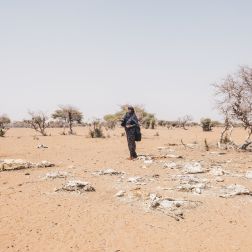- 4 mins read time
- Published: 24th March 2020
Fashion Relief: Lorraine Keane shines a light on the Rohingya crisis
A few weeks ago, the amazing community in Galway descended to The Galmont Hotel for Fashion Relief 2020. Some were there for the day out, others to bag a bargain. Yet whatever their reason for attending, everyone was doing their bit for vulnerable people experiencing climate change, conflict and hunger.
More than 700,000 people fled Myanmar when violence broke out in 2017, pushing the number of refugees in Bangladesh to almost 1 million. They arrived in the country suffering from both physical and psychological injuries, traumatised by the atrocities they had witnessed as they fled.

Lorraine Keane travelled to Bangladesh to see how the funds raised are helping those who need it most. Among those she met was Rohingya refugee and mother-of-four Naila, whose husband was shot as they fled their home in Myanmar.
Naila, who was pregnant with her fifth child at the time, also witnessed her 14-year-old son being killed before the family escaped across the border. Like countless others, Naila and her children ended up in Cox’s Bazar – the world’s largest refugee camp.

Diseases spread quickly through the flimsy shelters in the overcrowded camps of Cox’s Bazar, where the population density is four times the UN’s recommended levels. Respiratory infections, diarrhoea and malaria are rife, with children particularly vulnerable.

Meanwhile, more than a third of women say they don't feel safe going to collect water or using toilets and showers. As a result, they go to the toilet less or end up going to the toilet inside their tents, putting themselves at risk of disease.
Worryingly, there are also reports of women and girls being forced into sex to earn money to survive, and adolescent girls marrying due to their parents’ inability to feed them.
What Oxfam is doing to help the Rohingya people
We’re providing vital aid including clean water and food to Rohingya refugees in Cox’s Bazar. So far, we’ve helped 360,000 people in Bangladesh, while we’re also supporting 100,000 Rohingya in Myanmar with clean water and sanitation services.
In addition, we’re helping people stay healthy by installing water points, toilets and showers, and distributing soap and other essentials. We’ve recruited more than 600 Rohingya volunteers to help us reach other refugees with hygiene information, we’ve built the biggest-ever sewage plant in a refugee camp on site and our solar-powered water network provides safe water more effectively.
Meanwhile, we’ve provided 25,000 refugee households with vouchers that can be exchanged at local markets for fresh vegetables and ingredients. We’ve hired over 1,800 Bangladeshi locals to work on local construction projects including road repairs, schools and water sources and provided almost 400 local people with grants to start or expand their small businesses.
To help women feel safer after dark, we’ve installed more than 350 solar-powered streetlights around the camp and provided 20,000 torches and portable solar lanterns. We’ve also worked with women refugees to design more secure toilets and supplied them with fabric and vouchers so they can make or order clothes they feel more comfortable wearing in public.




